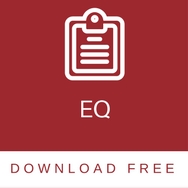
Emotional Intelligence
Emotional Intelligence is our ability to recognise, manage and appropriately leverage both our emotional state and that of those around us.
Emotional Intelligence is broken into two sets of competencies: Interpersonal (individual’s perception and management of their own emotional state eg. self awareness, self regulation and motivation) and Interpersonal (related to perceiving and managing the emotional state of others eg. empathy and social skills).
What is Emotional Quotient?
While it is often misunderstood as Intelligence Quotient (IQ), Emotional Quotient is different because instead of measuring your general intelligence, it measures your emotional intelligence.
Emotional Quotient is the ability to sense, understand and effectively apply the power and acumen of emotions to facilitate high levels of collaboration and productivity. In the business environment, Emotional Quotient is important because it helps you leverage your awareness of emotions for effectiveness in the workplace.
Assessing Emotional Quotient
The Emotional Quotient assessment measures an individual’s emotional intelligence with an online questionnaire that is immediately analyzed to produce a report with detailed information about the individual’s Emotional Quotient score. The higher the score in the report is, the higher the level of emotional intelligence will be.
At any level, the Emotional Quotient report will empower individuals to understand their own EQ so they can avoid making high-risk decisions without understanding how their emotions are influencing their choice. Instead they can make educated, sound decisions with their head, instead of just their heart.
The Five Areas of Emotional Quotient
The Emotional Quotient report focuses on five areas within interpersonal and intrapersonal intelligence. Interpersonal intelligence is the ability to understand oneself, while interpersonal intelligence is the ability to understand others.
- The ability to recognise and understand your moods, emotions and drives, as well as their effect on others.
- The ability to control or re-direct disruptive impulses and moods and the propensity to suspend judgment and think before acting.
- A passion to work for reasons that go beyond money and status and a propensity to pursue goals with energy and persistence.
- A proficiency in managing relationships and building networks.
- The ability to understand the emotional makeup of other people.
Applications in Your Business
With Emotional Quotient, you can improve the coaching and development process by giving superior performers the opportunity to truly understand their emotional intelligence.
The Emotional Quotient report will help identify ways they can take action to accelerate their Emotional Quotient development and leverage their new knowledge to make better decisions on the job.
EQ and Leadership
The single most important element in group intelligence is not the average, or even the highest IQ, but emotional intelligence. Executive EQ argues that a single participant who is low in EQ can lower the collective IQ of the entire group. Further, the EQ and emotional tone of the group is most strongly affected by the leader’s EQ. Emotional management is crucial in leadership. A good leader creates an emotionally safe workplace and successfully manages her own and others’ emotions. The EQ of leaders affects individual, group, and organizational outcomes. Research shows that the EQ of a team leader has positive effects on not only team members’ satisfaction, but also extra-role behaviour aimed at the entire organization. These findings suggest a ripple effect of positive outcomes that can be tied to leaders with high levels of EQ. Indeed, at the top levels of leadership, EQ accounts for as much as 90% of success.
Unfortunately, the focus of the majority of professional training and development solutions in the past two decades has been on skills and behaviours, not EQ. These methods, while well intentioned, only focus on teaching the outcomes of good EQ. But a focus on skills and behaviours is for naught if not coupled with a proven process on improving the emotional competence that underlies those competencies. A focus on improving cognition, behaviours and EQ will lead to a more effective workforce: an EQ powered workforce. The missing link to empowerment has now been identified.

